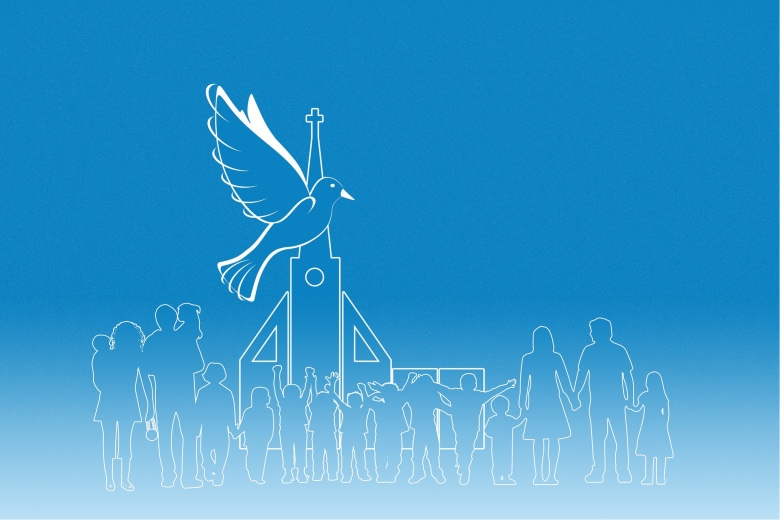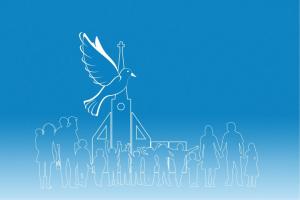-
 play_arrow
play_arrow
OchriO Streaming Live 24/7/365
-
 play_arrow
play_arrow
OchriO Live Stream
-
 play_arrow
play_arrow
London Calling Podcast Yana Bolder



“How Does the Holy Spirit Help the Apostles?”
In my first article on the subject of Pentecost, I considered the question, “What Happens at Pentecost?” In this article, I’ll look at a different question: “How does the Holy Spirit help the apostles?” Answering that question will help us to better understand how the Holy Spirit helps believers today.
“You Will Receive Power”
In Acts 1:8, just before he ascended back into heaven, Jesus told the disciples: “You will receive power when the Holy Spirit comes on you; and you will be my witnesses in Jerusalem, and in all Judea and Samaria, and to the ends of the earth.” The promised Holy Spirit would provide power to be witnesses – to tell others about Jesus.
That power first manifested itself on the day of Pentecost in Acts 2. That was ministry “in the moment”; the disciples had no idea what would happen when they woke up that morning. In fact, there is no indication that they expected anything to happen; they were gathered together praying in obedience to Jesus’ command to stay in Jerusalem and wait for the Holy Spirit (Acts 1:4-5). In that instance, the Holy Spirit empowered them before they realized what they were to do.
But the power that they received “in the moment” was not limited to that moment. In fact, the Spirit’s work transformed them. Peter and John spoke boldly to the Sanhedrin (Acts 4). All of the apostles continued to speak about Jesus and do miracles in his name – even in the face of beatings and death threats (Acts 5). And they also received power and insight on how to lead the Church as it continued to grow throughout the book of Acts.
“You Will Do Even Greater Things”
In John 14:12, Jesus tells his disciples: “Whoever believes in me will do the works I have been doing, and they will do even greater things than these, because I am going to the Father.” The point of Jesus’ “going to the Father” becomes clear when he says that the Father will send “another advocate to help you and be with you forever” (John 14:16). That advocate is the Holy Spirit. His coming empowered Jesus’ followers – both then and now – to do “even greater things.”
On the day of Pentecost, about 3000 believed and joined the company of the disciples. That’s more people than ever came to faith during Jesus’ earthly ministry. (He had larger crowds follow him, but they turned away when the teaching became difficult, see John 6:66.) After Stephen was martyred in Acts 7, the “disciples” – not the apostles – were scattered, taking the gospel into Samaria. Eventually, the church spread into all the known world – places where Jesus never ventured during his earthly life.
Jesus did not lose his status as the divine Son of God during his earthly ministry. However, his human body limited him during the incarnation. For example, he could not be in more than one place at a time. However, through the ministry of the Holy Spirit through all believers, the Church – the body of Christ – is in all the world. And the Spirit continues to inspire and empower believers to spread the gospel!
“He Will Teach You All Things, and Remind You of Everything I Have Said to You”
Jesus told the disciples that this advocate that the Father would send is “the Spirit of truth” (John 14:17). Later, he expands this to tell them: “But the Advocate, the Holy Spirit, whom the Father will send in my name, will teach you all things and will remind you of everything I have said to you” (John 14:26).
There were several times in John’s Gospel that the disciples did not understand Jesus’ teaching. However, later, they did – because of the Spirit’s enlightening work.
- “After he was raised from the dead, his disciples recalled what he had said. Then they believed the scripture and the words that Jesus had spoken” (John 2:22).
- “At first his disciples did not understand all this [the events and prophecies of his triumphal entry into Jerusalem]. Only after Jesus was glorified did they realize that these things had been written about him and that these things had been done to him” (John 12:16).
When the Spirit came upon them – after Jesus’ glorification – they remembered, and understood.
How Does the Holy Spirit Help Believers Today?
Some church traditions and theologies make a big distinction between “apostles” and “disciples.” The “apostles” were special; statements which applied to them don’t necessarily apply to “ordinary Christians.” However, as I noted in my previous article https://www.patheos.com/blogs/myjourney/2023/05/how-does-the-holy-spirit-help-the-disciples/, the gift of the Spirit and the empowerment that gift brought was not limited to “apostles.” While the “apostles” might have had specific responsibilities, there is no indication that they were given power that was not available to all believers.
Accordingly, I believe that the promises of the Spirit’s ministry are available to all believers. That includes (for example):
- the provision of spiritual gifts (1 Corinthians 12; Romans 12)
- the promise of direction for “what to say” (Luke 12)
- the production of spiritual fruit (Galatians 5)
- the confirmation of our status as God’s children (Romans 8:16)
Conclusion
“I am the Alpha and the Omega,” says the Lord God, “who is, and who was, and who is to come, the Almighty” (Revelation 1:8). God’s name in the Old Testament is often rendered as “I AM,” an indication of God’s unchanging eternal nature. Because the Holy Spirit is the Third Person of the Triune Godhead, the Spirit is also unchanging and eternal. This means that his ministry is still the same today as it was when Jesus first promised the Spirit to his followers.
The fact that the Spirit “came” at Pentecost does not mean that the Spirit didn’t exist prior to that time. Rather, Jesus’ death and resurrection changed the way that God reconciles people to himself. The new aspect of the Spirit’s ministry was thus an acknowledgment of the new way that Jesus provided for us to come to God.
The same Spirit who empowered the believers at Pentecost empowers believers today. Just as he did for the first Christians, the Spirit leads us into the truth and reminds us of what Jesus has taught us. While we could never do “greater things” than Jesus individually, the Spirit’s work enables us collectively as the body of Christ to do exactly what Jesus promised. The Holy Spirit helps us today just as he helped the apostles in the first days of Christian history!
Written by: OchriO
Similar posts
Recent Comments
No comments to show.Featured post

Latest posts
Current show
Upcoming shows

Impulse Amandla!!!
Presented by Dj Ross
09:00 - 12:00
Effulgent Amandla!!!
Presented by Dj Ross
12:00 - 15:00
Unretouched Amandla!!!
Presented by Dj Ross
15:00 - 18:00
Stratagem Amandla!!!
Presented by Dj Ross
18:00 - 21:00
Kindle Amandla!!!
Presented by Dj Ross
21:00 - 00:00Chart












Post comments (0)